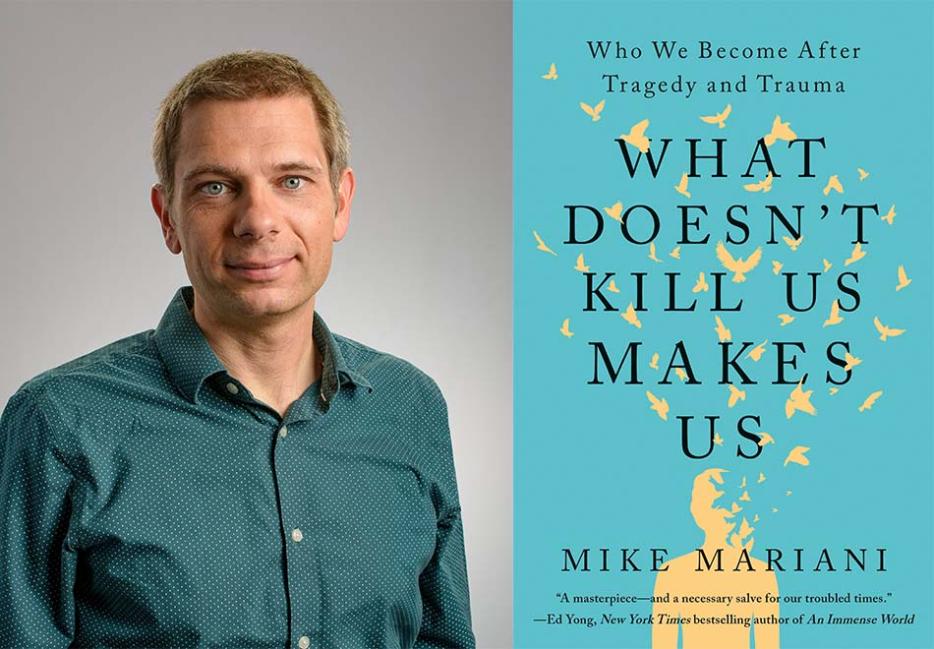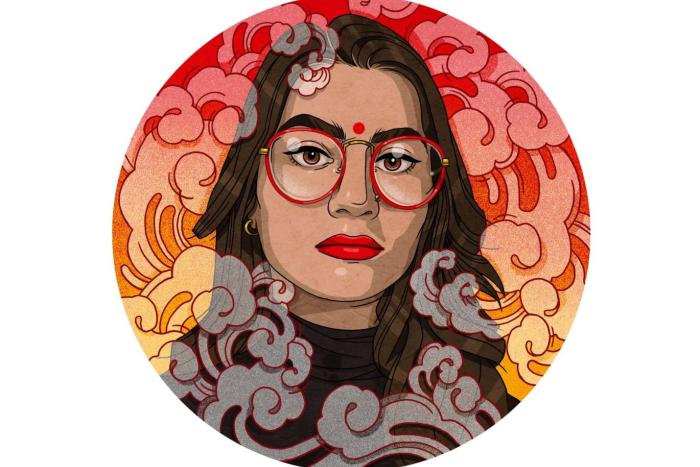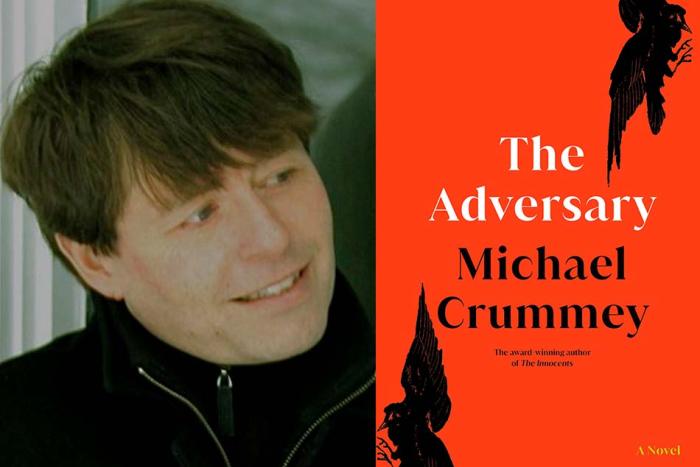Sometime in the mid-2010s, I became preoccupied with the phenomenon of accidental killers, specifically when a driver accidentally kills, with their car, a pedestrian or a fellow driver. My fixation centred not so much around the fear of my accidentally killing someone, but on how one’s life could take an unexpected, severe, and dramatic left turn.
Mike Mariani’s What Doesn’t Kill Us Makes Us stirred up this old preoccupation of mine vividly, illustrating in a myriad of ways how one’s life can be forged into uncharted, and perhaps more importantly, unexpected territory. Generously, he grounds his book with his own experiences of life taking shape in ways one could hardly anticipate, before visiting the lives of six other individuals. He begins with a review of his own, not uncomplicated, early life, where the tragic loss of his mother makes an indelible impact on his psyche. According to Mariani, though, her death had a clearer impact on his father’s life’s path, where the divergence was immediate and more marked than on his own. His teenage years then feature seduction by fast cars and alcohol, and some years later, he finds himself face-to-face with a debilitating and life-upending chronic illness. At first, Mariani’s symptoms evade diagnosis or, to some extent, clear definition, though their impacts are felt acutely. Finding his life and, arguably, his self, unrecognizable, the oft-repeated and vaunted advice of facing one’s challenges head-on more than just fails him, it does not apply. Eventually, Mariani is given a diagnosis of chronic fatigue syndrome (CFS), a diagnosis that, as I read it, feels far from clarifying. While diagnosis can initially offer clarity, it can also lead to more questions, making one’s newly unfamiliar existence that much more isolating.
CFS has a reputation of being difficult to pin down; however, in my experience, diagnoses of all kinds reflect a similar circumstance. Mariani, too, arrives at no easy conclusions about his own life or the lives of others, which, as a reader, living in a time where things are so often sold as black-and-white, provides the reader with both satisfaction and relief.
I called Mike on my cell phone to talk about his book, particularly in respect to the experiences of his youth and family of origin, and his subsequent diagnosis of CFS. In contrast to my day job, so to speak, there was no time for me to introduce myself and give a brief overview of my training and my approach. Below, we start off the discussion with an account of, on the recommendation of Mike’s sister, a therapy session that took place shortly after Mike’s return to the East Coast. Specifically, she recommended family constellation therapy, an approach that involves a therapist and often multiple actors performing the characters and experiences of the client’s life, or constellation.
Alice Blackwell: Early in the book, you recount your experience attending a family constellation therapy session, at your sister’s suggestion. Can you tell me about this experience?
Mike Mariani: I guess what really stuck out the most for me was just to kind of see the way that certain relationships and dynamics were kind of persistent, chronic obstacles in my life. That the CFS to some extent, maybe a lesser, more complicated extent, was in my relationship with my father.
With these complicated forces, and these obstacles, that I needed to surmount in order to achieve the goals and dreams and aspirations in my life. And yeah, just the way that the configuration solidified in that room, and the way that it really moved the other therapist and the other people that were attending the session, was also really powerful for me. To see these people that I’d never met before, to see their consonances and their expressions just totally transform when they saw this kind of theatrical representation of my life play out. That was really powerful, too.
To just see it in their faces, to share in that. I’m sure there are, and forgive me for saying this, but they’re like beyond words. To say that to a writer is maybe funny.
I think there’s something to that. I mean, I think we’re so used to hearing people kind of recount or narrativize their traumas and their hardships and their adversities that maybe we’re a little inured to it. So I like constellation therapy because it’s more illustrative, because it’s kind of more visual. And it’s so novel for people. That novelty, that lack of desensitization can really move people, and they can feel that sympathy or that shock and can really kind of empathize with the person in a way that might not be accessible to them if they were just listening in on the therapy session. Because, you know, we’ve seen and heard and participated in that dynamic so many times. I don’t think it moves us the way that seeing something performed that way can.
It’s like almost your life, performed for you. I can’t think of anything more immersive.
Right? No, exactly. I mean, I was sitting in a chair, watching the whole thing transpire and it was a little bit weird. Kind of hard to get accustomed to, but once I did, I would say it was pretty cathartic. And it was really meaningful to kind of get this more objective representation and configuration of my life.
There were moments in the book where I appreciated that you weren’t afraid to say where Nietzsche’s maxim “What doesn’t kill us, makes us stronger” failed to fully apply in some way. You point out in your chapter on resilience, that in some ways that maxim stands in contradiction to this resilience idea that psychologists have found to be a hallmark of folks who survive, that they have this ability to deflect change. But in my opinion, your book seems to say that change is inevitable, right? That there is this afterlife. Was there someone that you covered in the book or in your other work that you thought stood out, that you struggled to apply this concept to? Or did you find that you always found a way?
I mean, I guess what I would say is when I was first conceptualizing the book and sort of coming up with the parameters for the book, a significant amount of that criteria was based on my own experiences. I understood that for me, it was a catastrophic life event that kind of engendered an afterlife. For a person to have experienced that, they can’t really bounce back to the life that they had before. Because, you know, again, using myself as the first example of this, when I developed CFS years ago, obviously the thing that I wanted the most was to bounce back to my old life. I mean, that was by far the most sort of urgent objective. To get back to, you know, the work, the career, the lifestyle, the routine—all the things that I have and that I cherish. But, after a certain amount of time, it became pretty clear that that’s just not an option. Based on your health limitations, you cannot reclaim this territory. You have to go out, strike out and find something else. And so to me, that scenario, that’s what I was looking for in all the people that I interviewed for the book. To have a catastrophic life event that engendered an afterlife, that meant that they really couldn’t go back to the life they had before. And so that scenario, like that sort of equation, to my mind sort of stands in contradiction to our general societal understanding of resilience—that we value and exalt resilience because we think it’s this characteristic that’s going to help us deflect change, pretty much because ultimately none of us really want unforeseen change.
We want to be able to kind of march forward on our life trajectory, the way that we envision it. And so that’s why resilience is so precious to us, because this is this powerful characteristic that’s going to help us to stay on our preferred life trajectory. But you know, to me, and I think I discussed this a little bit in that chapter on fortitude, resilience doesn’t apply to every situation.
In my opinion, if your situation is such that you really can’t go back to the life you had, whether it’s because you were paralyzed, because you suffered a traumatic brain injury, because you were incarcerated for twenty years, yeah, then you need to find something else. You need to find another framework or schema or way of looking at your future. Because resilience to me, based on its definition, doesn’t really fully, at least like the general understanding of it, just doesn’t apply in the way that maybe we would like it to.
I feel like resilience, too, is an unfortunate characteristic of this tragic phenomenon we call wellness culture. Maybe you don’t have that same association?
No, I feel that overlap. Yeah, I’m not totally sure what the kind of overarching theme is. I think it’s just, you know, self-preservation. And just kind of being able to live your best life. And not remain unpassed or unharmed by serious change completely.
Or maybe also like an American ideal of pulling up yourself by your bootstraps.
I think so. Definitely. Resilience is definitely wrapped up in that old-fashioned American individualism. And just the ideas of persistence, perseverance, all the kind of exalted characteristics. Resilience is kind of mixed into that combination of traits that we cherish.
I mean, unfortunately I just think that that framework or that picture, there’s a lot of things that it’s not taking into account, and there’s things that are outside of our control that are going to affect some of our lives. Sheer individualism can’t overcome everything.
Can you imagine writing this book without framing it within your own personal experience? There’s a lot of emphasis in my world on lived experience.
Yeah, I mean, I think that’s a really cool, interesting question. I really don’t think so because I think that the kind of seeds of this book came from personal experience. I don’t think my compass would’ve really swung in this direction if it weren’t for personal experience—and I also think, you know, the major premise that it kind of hinges on.
Just the idea of interrogating and questioning Nietzsche’s aphorism about what doesn’t kill us makes us stronger—I don’t think I would’ve arrived at this place of ambiguity and frustration with that aphorism if I wasn’t, you know, experiencing it in my own life. And if I wasn’t learning about how real life kind of subverts or contradicts or complicates.
That aphorism, when it comes to catastrophic life events, I think that, as a reporter, some of these stories individually might be fascinating and have a lot of journalistic merit if you look at how incarceration can transform a person’s life, or how a traumatic brain injury can change a person’s personality and their relationships with the people in their lives. Things like that. Personally, I think [the stories] can kind of stand on their own. And they warrant investigation and reporting, and I think they deserve an audience.
But in terms of the bigger framework that they’re all being fit into, how do we actually change after these catastrophic life events in a kind of un-glamorized, un-romanticized way? To me, there’s no way I would have asked that question [before the diagnosis].
Yeah, absolutely. I think as a reader, I’m just much more inclined to know while that no person’s experience is the same as another’s, and that we’re always bridging a gap between my experience and another’s experience, that you coming from a place of experience generally with this trauma and these life-altering events just makes me more interested and trusting in your perspective.
Yeah, I appreciate that. I think that a reader wants a writer with at least a little bit of kind of either personal stake or some level of authority whether it’s, again, through personal experience or otherwise. It just wouldn’t have quite the same texture, the emotional valences and the sense of urgency, to really try to kind of seek out through people’s lives.
I have another question. It’s sort of diverges from what we’ve been talking about, in a way.
For a long time, my field has focused exclusively on the psychological impacts of trauma. But there’s a shift in my field away from this Western approach, and toward a conceptualization of trauma as being both psychological and physiological, and that it’s somewhat arbitrary to make a distinction between the two. So yeah, I’d be curious to hear what you think about that. Do you think that there’s been more attention paid to the physiological aspects than the psychological impacts?
I wouldn’t call myself an expert on trauma, but based on the research that I did for the book, I think the kind of the trajectory that you just laid out seems pretty accurate. Seems to kind of track, in the sense of [how] we understood the term trauma in our kind of collective lexicon.
It was physical trauma, you know, blunt force trauma, right. The kind of trauma that lands you in the emergency room, in the ICU. You know, as I kind of talk about it, I think in the introduction in the book, probably in the ’90s there was more discussion of psychological trauma because we were thinking about combat veterans. We were thinking about domestic abuse survivors. We were thinking about sexual assault survivors. And so this idea of, well, these types of kind of horrifying experiences, the fact that they leave this impact, this legacy on us mentally and psychologically, like that needs to be reckoned with.
And so then like you said, the emphasis really shifted to the psychological. And then, maybe in the 2010s or something, obviously a huge touchstone is The Body Keeps the Score, that massively popular non-fiction work. I think we’re now, as of the past five to ten years, moving towards a more integrated approach where we recognize that it affects the mind and the body. And yeah, I think the distinction, like you said, that they may very well be arbitrary because there are probably feedback loops going on. I mean when things affect your brain like that it’s going to affect your thoughts and your body.
I think that’s the thing, like some of this trauma is neurological and so when it’s happening at the level of the brain, that’s affecting mind and body, I think, equally. And so I think trying to isolate one or the other, or to come up with, you know, a framework for one or the other is probably counterproductive.
I’m wondering, since the book has been published, and I don’t want to overstep or anything, but I’m wondering how you’re doing in your life currently with your illness, and other areas of interest, related to the work or not. Like, what are you working on or thinking about right now?
I would say, I mean, as far as like the illness is concerned, it’s unfortunately, like for a lot of people, a lifelong condition. It’s probably always going to be a part of my life in terms of trying to seek out treatments.
What’s happened with the pandemic and with COVID and the emergence of long COVID has been actually a pretty significant development for people with my condition, with chronic fatigue syndrome. You know, a lot of sub-patients and scientists and doctors believe that a significant subset of people with long COVID have developed CFS, that these conditions are very strongly linked. So the population of people with CFS has really increased dramatically since the pandemic, and that’s you know, on one level, extremely unfortunate because I wouldn’t wish this condition and the symptomatology on anyone. But on the other hand, it also does bring a lot more attention and research funding to the condition. So we can only hope, and I can only hope, that in the next, you know, few months and a few years, there’s going to be a lot more treatments out there that are going to work for long COVID and CFS, or at least, you know, some subset of long COVID.
And so that’s something that I’m definitely very interested in. I hope that it changes the landscape for my condition because it really has been underrepresented and, to some extent, neglected by the medical community for a long time. Or maybe not neglected, at least, but it hasn’t, in my opinion, gotten the attention and the funding that its severity warrants. So that’s what I would say is a really significant development since I started writing the book.
And then in terms of other interests, one thing I’ve been looking at is how in our culture we talk about what it means to be damaged and why we see certain people as quote-unquote damaged and what that means. So, I’ve been interested in that idea and trying to kind of get underneath why we kind of categorize people in that way, and what that categorization kind of allows us to do in terms of dismissing or dehumanizing certain people, and trying to understand those types of lives.






